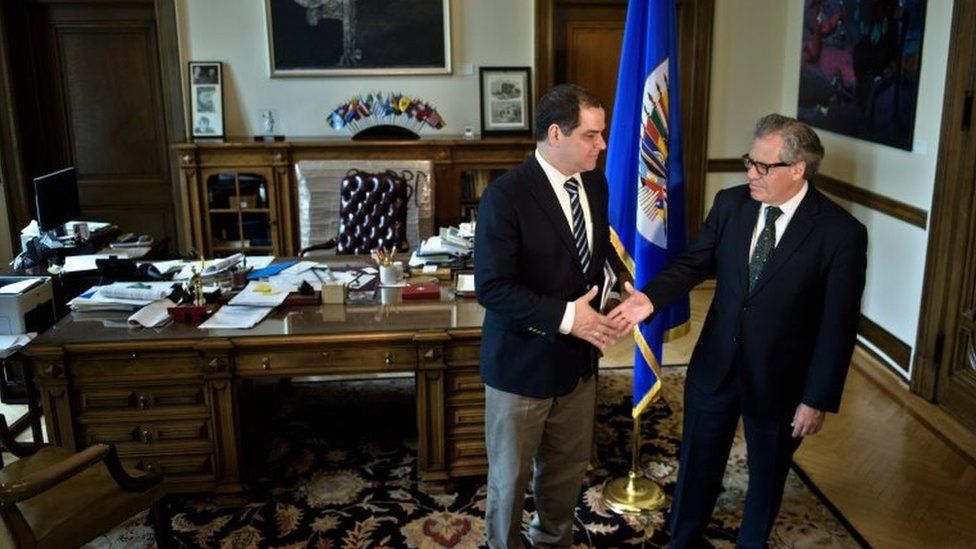Venezuela: OAS head calls emergency meeting over crisis
- Published

Venezuela's government came under renewed pressure on Tuesday when regional body Organization of American States called for an emergency meeting.
OAS head Luis Almagro wants members to evaluate whether Venezuela has suffered an "unconstitutional alteration of the constitutional regime that seriously impairs the democratic order".
Venezuelan opposition politicians had urged the OAS to call the meeting.
The move could lead to Venezuela being suspended from the OAS.
"The secretary general considers that the institutional crisis in Venezuela demands immediate changes to the Executive power," a statement by Mr Almagro read.
Venezuela's President Nicolas Maduro reacted angrily, accusing the OAS of "foreign intervention" and ordering it to leave Venezuela and the Americas.
He also said he would bring charges against the leaders of Congress who had requested the OAS to intervene, saying they had betrayed the nation.
The government of President Nicolas Maduro has been coming under increasing pressure to work with the opposition-controlled National Assembly to ease the political and economic tension in the South American country.
The two sides have been engaged in a stand-off ever since the MUD opposition coalition won control of the National Assembly in parliamentary elections in December.
MUD politicians say their every move is thwarted by the Supreme Court and the National Electoral Council, bodies they allege have been stacked with supporters of President Maduro.
OAS
- Founded in 1948 as a body to promote regional solidarity and co-operation
- Has 34 participating member states in the Caribbean and North, Central and South America
- Current Secretary General is Uruguayan former foreign minister Luis Almagro
They say there is no separation of powers and that under the leadership of President Maduro and his predecessor in office, the late Hugo Chavez, the judiciary has become a willing enforcer of the executive branch.
They point to the fact that the Supreme Court blocked key legislation, such as an amnesty law which would have freed jailed opposition politicians, as evidence of what they say is a misuse of power by President Maduro.
Opposition politicians also accuse the president of trying to block a recall referendum which could see Venezuelans vote on whether they want Mr Maduro to serve out his term or be removed from office.
A National Assembly delegation met Mr Almagro in recent weeks to ask him to invoke the Inter-American democratic charter.
Inter-American democratic charter
- Adopted in 2001
- Can be invoked when there is a forcible overthrow of a democratic government, when the democratic order has been unconstitutionally interrupted in a member state, or when the democratic order is seriously impaired
- Can lead to the suspension of the member state if two-thirds of the OAS member states vote in favour
- In 2009, the clause was invoked and OAS member states voted in favour of Honduras' suspension following the ousting of President Manuel Zelaya
Under the charter, the OAS secretary-general can call a meeting of the OAS Permanent Council to address situations where he or she considers that a member state's democratic order is at risk.
If two thirds of OAS members consider that Venezuela's government has undermined democracy, the country will be suspended from the OAS.
The meeting is expected to be held sometime between the 10 and 20 of June and is expected to coincide with the meeting of the OAS General Assembly in the Dominican Republic between 13 and 15 June.
Relations between the OAS and Venezuela have been tense for years but worsened in recent months as Mr Almagro and Mr Maduro traded insults.
Mr Maduro accused the OAS head of being a CIA agent, while Mr Almagro said that not letting the recall referendum go ahead made Mr Maduro "another petty dictator".
The Venezuelan government has called its supporters to take to the streets on Wednesday to protest against the OAS' "vulgar and brutal interference".
- Published19 May 2016
- Published1 June 2011